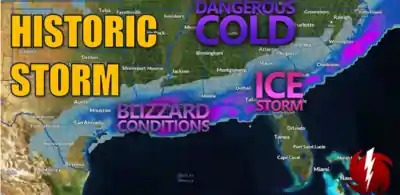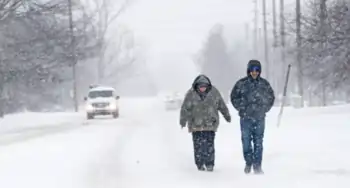
The Gulf Coast is grappling with an unprecedented winter storm that has brought historic snowfall and freezing temperatures to regions unaccustomed to such extreme weather. Meteorologists and public agencies have issued urgent warnings about health risks, potential power outages, and widespread travel disruptions. This rare event has prompted emergency declarations across multiple states as residents brace for severe cold and hazardous conditions.
Unprecedented Arctic Blast Hits Southern U.S.
The National Weather Service (NWS) has described this event as a “significant winter storm” fueled by a combination of Arctic air and a low-pressure system. Temperatures are forecasted to be 20 to 30 degrees below the January average across the southern and eastern United States, with single-digit lows expected in parts of the Midwest.
- Record-Breaking Lows: Many locations along the Gulf Coast and Tennessee Valley could see record-setting temperatures by Wednesday morning.
- Wide Impact Area: The storm’s reach spans from Texas to Florida and up into the Northeast, affecting millions of Americans.
Historic Snowfall and Ice Accumulation
Snow and ice accumulation are among the most dangerous elements of this storm, with some areas anticipating record-breaking totals:
- Houston and New Orleans: Up to 6 inches of snow is forecasted, along with freezing rain and sleet.
- Alabama and Georgia: Parts of these states may see up to 4 inches of snow, while freezing rain is likely further east.
- Midwest and Northeast: Bitter cold winds and snow showers will continue to plague areas such as Nebraska, Kansas, and New York, with temperatures dipping to as low as -30°F in some regions.
Health and Safety Warnings

- Frostbite and Hypothermia Risk: Prolonged exposure to temperatures as low as -25°F could result in frostbite within 30 minutes. Residents are urged to cover exposed skin and limit time outdoors.
- Travel Restrictions: Officials are strongly advising against non-essential travel as roads become treacherous with ice and snow. Louisiana Governor Jeff Landry emphasized, “It is extremely important to stay off the road unless absolutely necessary.”
- Power Outages: The Electric Reliability Council of Texas (ERCOT) has issued an emergency advisory for potential long-lasting outages due to ice-laden trees and power lines.
Flight Cancellations and Travel Disruptions
The storm has caused major disruptions to air travel:
- Both George Bush Intercontinental Airport and Hobby Airport in Houston suspended operations as temperatures plummeted to 25°F.
- Over 1,800 flights were canceled nationwide, with an additional 400 experiencing delays, according to FlightAware.
State Emergency Responses
Governors in Texas, Louisiana, Alabama, Mississippi, Georgia, and Florida have declared states of emergency:
- Salt and Road Preparations: Louisiana’s Department of Transportation has stockpiled 400,000 pounds of salt to combat ice on major roadways.
- Emergency Shelters: Many states have opened warming shelters to protect vulnerable populations from the extreme cold.
Extreme Weather Beyond the Gulf
The storm’s effects are being felt far beyond the Gulf Coast:
- Rocky Mountains and Northern Plains: Wind chills as low as -55°F are creating life-threatening conditions.
- Northeast Corridor: Major cities such as New York could experience chills reaching -25°F, compounding travel and infrastructure challenges.
Tips for Staying Safe During the Storm
- Prepare Your Home: Prevent frozen pipes by letting faucets drip and insulating exposed pipes.
- Winterize Vehicles: Ensure tires, batteries, and antifreeze levels are suitable for extreme cold.
- Emergency Kits: Keep flashlights, batteries, blankets, and non-perishable food in case of power outages.
- Monitor Updates: Stay tuned to local weather reports and emergency broadcasts.

Advertisement
Final Thoughts
This rare winter storm underscores the importance of preparedness and caution in the face of extreme weather. Residents across the Gulf Coast and beyond are urged to stay safe, heed warnings, and take proactive measures to protect their families and homes. As this storm continues to unfold, it serves as a stark reminder of nature’s power and unpredictability.
FAQs
- How long will the winter storm last? The storm is expected to impact the Gulf Coast and surrounding regions for several days, with lingering cold temperatures.
- What areas are most at risk? States along the Gulf Coast, including Texas, Louisiana, Alabama, and parts of Florida, are facing the greatest risk of snow, ice, and power outages.
- What should I do if my power goes out? Use alternative heating sources safely, avoid carbon monoxide poisoning by not using generators indoors, and stay bundled in warm clothing.
Disclaimer: Always prioritize safety and follow local advisories. For immediate assistance, contact local emergency services or utility companies.








